Contents

In a retail store, customers can browse racks of products, evaluating their appearance and materials. However, online shoppers don’t have this luxury. Unlike in a physical store, customers can’t touch or feel the products they’re interested in, making it harder for affiliate marketers to convince them to make a purchase.
This is where ecommerce merchandising comes in.
There are several ways to enhance your ecommerce merchandising strategy, such as establishing a consistent visual brand and creating an online shopping experience that’s fast, mobile-friendly, and easy to navigate.
In this blog, we’ll explore what ecommerce merchandising is and why it is crucial for your success as an affiliate marketer. We’ll also provide you with 4 practical ways to improve your ecommerce merchandising strategy and increase your sales. Let’s get started!
An Introduction to Ecommerce Merchandising
Traditional brick-and-mortar retail stores rely on visual merchandising. When a customer walks into the store, they can physically see, touch, and experience the products. However, online stores can’t market their products in the same way.
Ecommerce merchandising is the method used to sell virtual products on a website. How you present your products can make or break a sale, as it can either entice an online visitor to add items to their cart or prompt them to leave the page. Hence, having an effective ecommerce merchandising strategy is vital in converting visitors into customers.
Here are some key areas of ecommerce merchandising:
- Brand Visuals: Online stores should have a consistent brand identity that is recognizable and memorable.
- User Experience (UX) and User Interface (UI): An ecommerce site should have a high-quality design that is easy to navigate.
- Personalization: You can recommend specific products to customers based on their search history.
As you can see, marketing strategies are very different for online stores. Customers cannot experience the products first-hand, but there are ways to optimize the virtual shopping experience.
4 Ways to Improve Ecommerce Merchandising
If you’re an affiliate marketer, it’s important to optimize your ecommerce merchandising strategies. Otherwise, visitors may not want to buy products through your website.
To help you get started, here are 4 methods to improve ecommerce merchandising!
1. Improve Your Brand Visuals
As we mentioned earlier, ecommerce merchandising is about brand identity. Since customers can’t visit your store in person, you’ll have to sell products visually.
When you’re building your affiliate website, it’s important to stay consistent. Before users purchase your products, they’ll want to know about you and your expertise.
For example, Abby Organizes is an affiliate website that promotes home decor and organization tips. Using soft pastels and lots of white space, the web design perfectly displays a consistent brand:
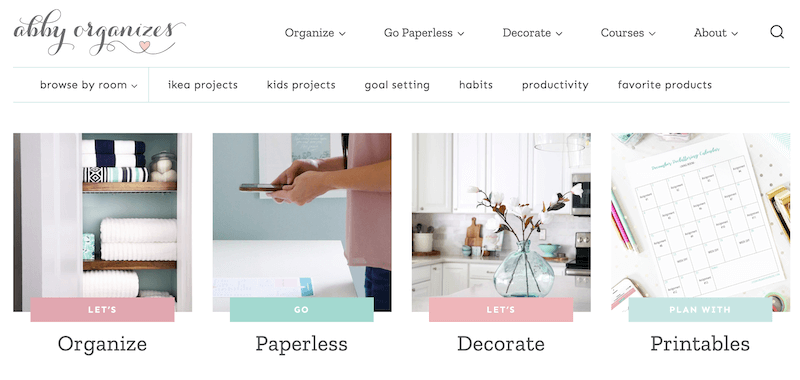
As an affiliate, you’ll include affiliate products throughout your blog posts. To ensure visitors buy them, you’ll need to feature high-quality images and videos of the main features:
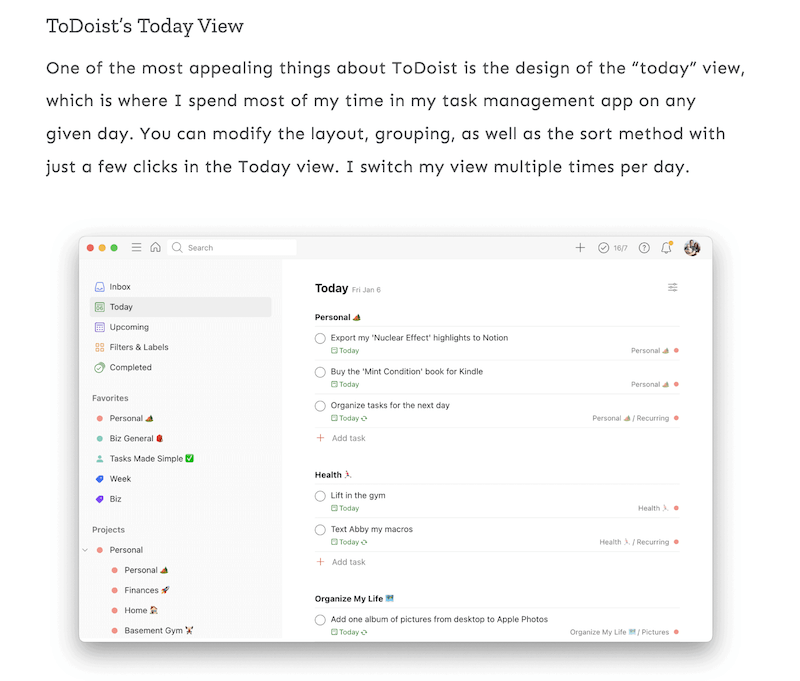
This will properly advertise affiliate products, even though online customers can’t experience them. By showcasing the item with great visuals, you’ll likely gain higher conversions.
2. Optimize Your Site for Mobile Devices
Statistics show that 90% of Americans between the ages of 18 to 49 use their mobile devices to make online purchases. Therefore, if your affiliate website is not optimized for mobile use, it’s extremely likely that you’re missing out on a ton of conversions.
When visitors come to your site, they expect fast and responsive pages. Slow loading times could result in them leaving for your competitors. This can lead to a high bounce rate.
In fact, studies have shown that a mere increase in page load time from 1 second to 3 seconds can result in a 32% increase in bounce rates.
Heavy images often lead to poor page speed. To make your affiliate website faster, we’d recommend installing a plugin like TinyPNG. This tool will automatically compress images as you upload them:

Alternatively, your website could have bulky scripts that negatively impact performance. Instead of trying to optimize your code manually, you can install Autoptimize. With this plugin, you’ll minify CSS and JavaScript so that your site is lightweight and fast:

When you focus on mobile-friendliness, you can keep potential customers on your site. Then, you’ll be able to promote your affiliate products and gain more sales.
3. Learn from Analytics
To make sure you’re promoting the right products to your visitors, it’s important to understand their needs. You can achieve this thanks to web analytics. Once you collect information about your target audience, you’ll be able to improve your ecommerce merchandising techniques.
Google Analytics is a powerful tool for website analytics. After you create an account and register your website, you can see your audience demographics. This will give you data about your visitors’ location, gender, age, and main interests:
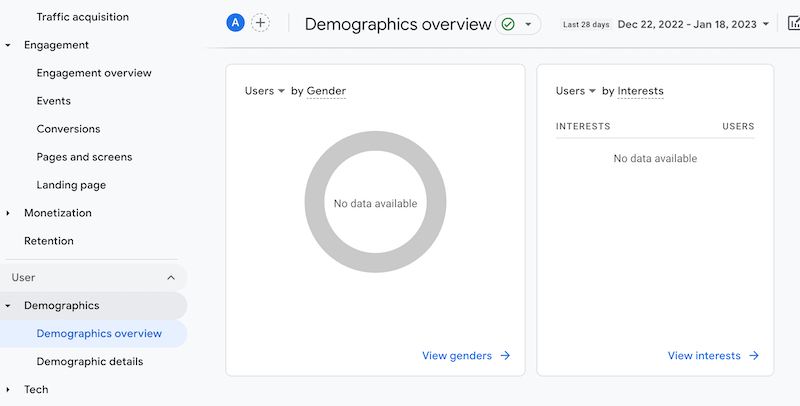
Under Engagement, you can analyze which of your posts is the most popular. Then, be sure to check how many of your visitors purchased affiliate products:
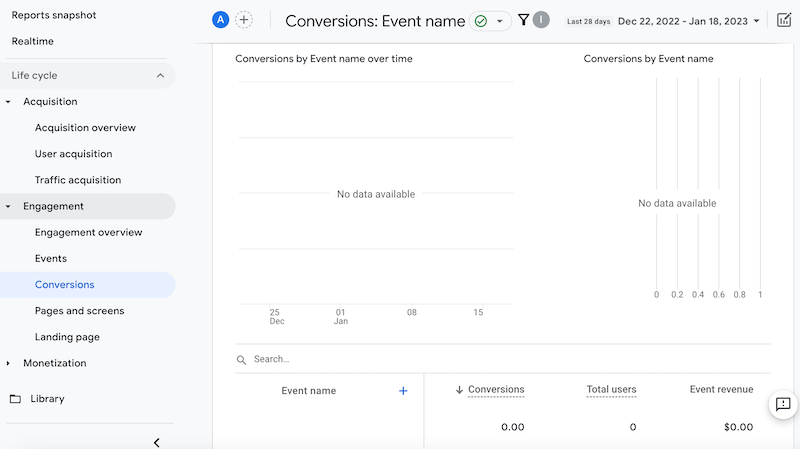
Knowing this information can help you find what content your audience is most interested in. This can help you start promoting high-yield products.
Additionally, if you use a WordPress plugin like ThirstyAffiliates, you can create unique affiliate campaigns with categories. Then, you can track them to see how they perform. Using this data, you’ll be able to further hone in on the best affiliate products for your business.
4. Improve Your Navigation
Lastly, your website should be easy to navigate. If new visitors are unable to find the content they need, they’ll quickly leave. To encourage repeat visits and sales, you’ll want to improve your navigation.
For affiliate bloggers, you might be tempted to list all your posts on one blog page. If you have many published articles, however, this may make it difficult to find specific product reviews. In this case, consider adding different categories to your menu:
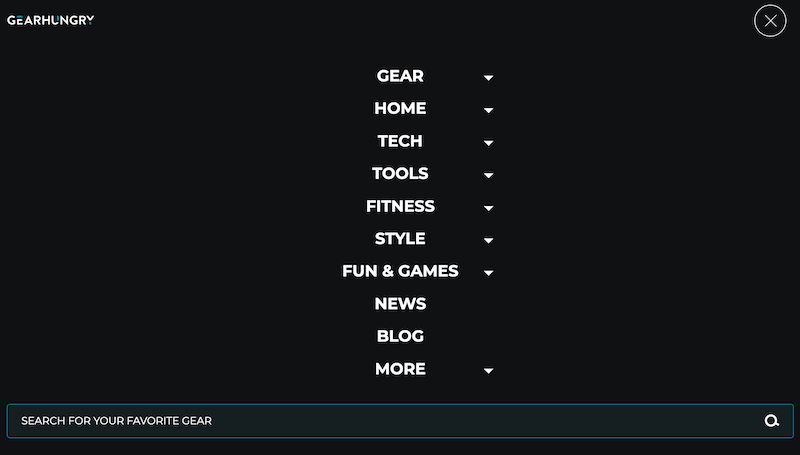
It can also be helpful to include a search bar. In the WordPress Site Editor, you can add this feature with a search block:
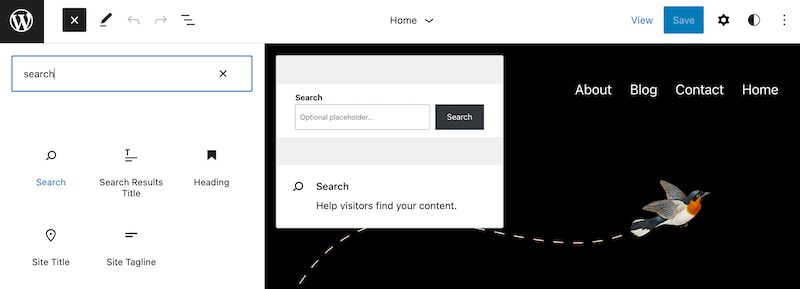
Then, be sure to view your website on different devices. If it easily adapts to different screens without cutting off certain features, visitors will be able to easily find and buy your affiliate products. This can improve your ecommerce merchandising!
Conclusion
Compared to a retail store, ecommerce can be much more daunting. In order to sell your affiliate products, you’ll need to focus on ecommerce merchandising. This will improve the way you display items on your website and, as a result, increase sales.
To review, here are some ways to improve ecommerce merchandising:
- Improve your brand visuals.
- Optimize your site for mobile devices using TinyPNG and Autoptimize.
- Learn from analytics, using Google Analytics and ThirstyAffiliates.
- Improve your navigation.
Do you have any questions about how to improve your ecommerce merchandising strategy? Ask us in the comments section!
If you liked this post, be sure to follow us on Twitter, Instagram, Facebook, Pinterest, and LinkedIn! And don’t forget to subscribe in the box below.

Great insights John. You could also consider the use of augmented reality in eCommerce. With this AR use case purchasers can enjoy an immersive experience. Of course as you laid it out nicely in our article – AR compliments the basics of clear and user friendly website design, quality product visuals, user friendly navigation. Thanks for the write up!!
Yes great share John, Ecommerce merchandising is evolving each year, new techniques and merchandising strategies are emerging to draw customers in and encourage them to spend their money.
What specific actions can online retailers take to improve their e-commerce merchandising strategy and thereby increase sales and customer retention?
Hi John,
Thank you for this informative and helpful post. I learned a lot from your tips on how to improve ecommerce merchandising.
I agree that having a consistent brand identity and a high-quality website design are crucial for attracting and retaining customers. I also liked your suggestion of using ThirstyAffiliates to cloak and track your affiliate links. I think this is a smart way to optimize your conversions and commissions.
I’m curious to know more about how you use personalization and analytics to recommend products to your visitors. Do you have any tools or strategies that you can share?
Thanks again for sharing your insights and expertise.
Merchandising is the key to success in e-commerce. The right online merchandising strategy can boost your sales, engage your shoppers and guide them towards exciting products.
Ecommerce merchandising is a term used to describe the process of curating and managing the products available for purchase on a website. Merchandising involves making decisions about which products to stock, how to organize the products, and the best methods for promoting them. Ecommerce merchandising is a critical part of any successful online store, as it can have a major impact on the overall customer experience and the profitability of the business.
The goal of ecommerce merchandising is to create an environment that encourages customers to purchase from the website. This might include organizing products by departments, categories, and subcategories, creating product recommendations, and setting up promotions. By creating an effective merchandising strategy, online stores can increase their sales and build relationships with their customers.
The first step in creating an effective ecommerce merchandising strategy is to identify the types of products that the website will sell. This includes identifying the target market, the types of products that are in demand, and the types of products that will be most profitable. It is important to consider the customer’s needs and wants when creating the product selection.
Once the products have been identified, the next step is to create an effective product catalog. This includes creating.
Great article! As an ecommerce store owner, I’ve found that effective merchandising is key to driving sales and increasing customer engagement. Your four tips on how to improve ecommerce merchandising are spot-on.
Thank you so much for sharing valuable information. I didn’t know before how to optimize a site, after optimizing pictures from tiny png then converting them into webp, my site speed optimize upto 89%. thanks man.
Hi there! I really enjoyed reading your blog. Your writing style is engaging and informative, and I appreciate the helpful tips and insights you shared. Your website is also well-designed and easy to navigate, which makes it a pleasure to explore.
oh nice blog information also good . Optimize Product Presentation: Use high-quality images, videos, and detailed product descriptions to showcase your merchandise. Highlight key features and benefits to attract and engage potential customers.
Implement Personalization: Leverage customer data to offer personalized product recommendations and tailored shopping experiences. Utilize tools like recommendation engines and dynamic content to increase relevancy and boost conversions.
Streamline Navigation: Ensure your website’s navigation is intuitive and user-friendly. Organize products into logical categories and subcategories, enabling customers to easily find what they’re looking for. Implement filters and search functionality to enhance usability.
Leverage Social Proof: Display customer reviews, ratings, and testimonials to build trust and credibility. Encourage satisfied customers to leave feedback and share their experiences. Use social proof to influence purchasing decisions and build confidence in your products.
I’m truly grateful for the valuable information you shared. Prior to learning about optimizing images by using Tiny PNG and converting them to WebP, I had no idea how to improve my site’s performance. Thanks to your advice, my site’s speed has skyrocketed by an impressive 89%! Your expertise is greatly appreciated. Thank you!
Great article on improving ecommerce merchandising! It’s no secret that effective merchandising plays a crucial role in attracting and engaging customers on an online platform. The four strategies you mentioned are spot on and provide valuable insights for anyone looking to boost their ecommerce success.
Fantastic tips for enhancing ecommerce merchandising! Effective product categorization and visual appeal play a vital role in creating a seamless shopping experience. Combined with personalized recommendations and compelling product descriptions, they can significantly improve customer engagement and drive sales. Thanks for sharing these valuable strategies!
Thanks for sharing these helpful tips on improving ecommerce merchandising! I particularly like the idea of using personalization and product recommendations to guide online shoppers. Looking forward to putting these strategies into practice.
I completely agree with you, John. The field of ecommerce merchandising is constantly evolving, and it’s fascinating to witness the emergence of new techniques and strategies to attract and engage customers. Staying up-to-date with these trends is crucial for affiliate marketers to effectively promote products and encourage conversions.
In today’s competitive online marketplace, it’s not just about showcasing products; it’s about creating compelling experiences that resonate with customers and motivate them to make purchases. From personalized recommendations to interactive product displays, the possibilities for innovative merchandising strategies are endless.
By staying informed and implementing these evolving techniques, affiliate marketers can stay ahead of the curve and maximize their success. Thank you for sharing this insightful post and highlighting the importance of keeping up with the latest trends in ecommerce merchandising.
Absolutely great article. and great ideas I have been helped and now I know what I should be doing to improve my page rankings.
Really great tips!
Here’s one more tip from my side: Utilizing compelling visuals, such as high-quality product images and videos, along with informative product information, can significantly help boost sales and drive conversions for your eCommerce store.
Fantastic article! Improving your ecommerce merchandising is absolutely crucial in today’s competitive online market. The key lies in understanding your target audience and providing them with an exceptional shopping experience. Effective product categorization, eye-catching visuals, and clear product descriptions are vital to grab and retain customers’ attention. Additionally, don’t forget the power of personalization – tailoring recommendations based on user behavior can significantly boost conversions. Keep up the great work, and let’s all strive to create a seamless and delightful shopping journey for our customers
Thanks for sharing these helpful tips on improving ecommerce merchandising! I particularly like the idea of using personalization and product recommendations to guide online shoppers.
Great article on improving ecommerce merchandising! It’s no secret that effective merchandising plays a crucial role in attracting and engaging customers on an online platform.
The right online merchandising strategy can boost your sales, engage your shoppers and guide them towards exciting products.
Fantastic tips for enhancing ecommerce merchandising! Effective product categorization and visual appeal play a vital role in creating a seamless shopping experience.
Of course as you laid it out nicely in our article – AR compliments the basics of clear and user friendly website design, quality product visuals, user friendly navigation. Thanks for the write up!!
it helps me alot to get backlinks for my website. Thanks for sharing this.
I also liked your suggestion of using Thirsty Affiliates to cloak and track your affiliate links. I think this is a smart way to optimize your conversions and commissions.
This informations is very helpful for me. Implementing these tips not only enhances the overall shopping journey but also boosts conversions.
Thank you so much for this incredible guide